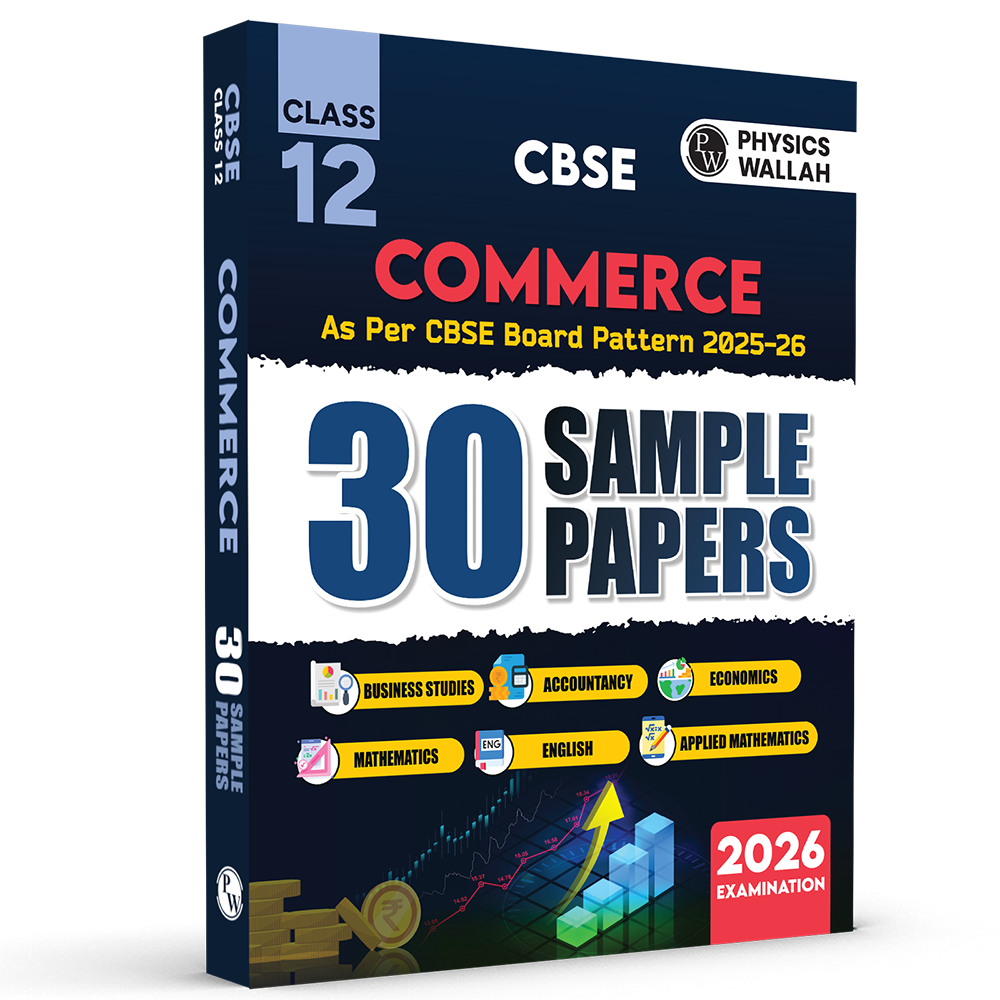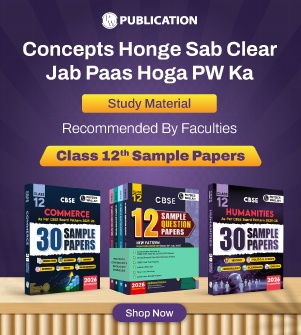Class 12 Commerce Syllabus 2024-25:- The CBSE recently published the CBSE 12th Commerce Syllabus for 2025 on March 22, 2024, through its official website, cbseacademic.nic.in. Scheduled to commence on February 15, 2025, the CBSE Class 12th exams are approaching. It's crucial for students to thoroughly examine the CBSE Commerce Syllabus 2025. This syllabus covers a wide range of subjects and is designed to provide students with a deep understanding of various topics.
It's highly recommended that students carefully review the CBSE Commerce Syllabus 2025 to plan their study schedule effectively. Understanding the CBSE 12th Commerce Exam Pattern for 2025 is also important, as it outlines the marking scheme and question formats. The CBSE 12th Datesheet for 2025 exams will be released in December 2024. Students can download the CBSE 12th Commerce syllabus 2025 from the official website.
In addition to studying the syllabus, students need to solve CBSE 12th sample papers and previous years' question papers to assess their preparation. They can also benefit from CBSE Commerce preparation tips for Class 12 to improve their exam approach. By following these guidelines and resources, students can better prepare themselves for the upcoming CBSE Class 12th Commerce exams in 2025.
CBSE 12th Mathematics Syllabus 2025
The CBSE 12th Mathematics Syllabus 2025 is designed to provide students with a comprehensive understanding of mathematical concepts and applications at an advanced level.
|
CBSE 12th Mathematics Syllabus 2025
|
|
Unit
|
Part
|
Topics
|
|
I
|
Sets and Functions
|
-
Sets: Representations, Empty set, Finite and Infinite sets, Equal sets, Subsets, Universal set, Venn diagrams, Union, Intersection, Difference, Complement, Properties. NCERT Solutions for Sets
-
Relations & Functions: Ordered pairs, Cartesian product, Definition of relation, Domain, Co-domain, Range, Function, Real-valued functions, Graphs, Sum, Difference, Product, Quotients. NCERT Solution for Relations & Functions
-
Trigonometric Functions: Angles, Measures, Definition, Truth of identity, Signs, Domain, Range, Graphs, Expressions. NCERT Solutions for Trigonometric Functions
|
|
II
|
Algebra
|
-
Complex Numbers and Quadratic Equations: Complex numbers, Algebraic properties, Argand plane. NCERT Solutions for Complex Numbers and Quadratic Equations Linear Inequalities: Algebraic solutions, Representation. NCERT Solutions for Linear Inequalities
-
Permutations and Combinations: Fundamental principle, Factorial, Formulae, Applications. NCERT Solutions for Permutations and Combinations
-
Binomial Theorem: Statement, Proof, Pascal’s triangle, Applications. NCERT Solutions for Binomial Theorem
-
Sequence and Series: Arithmetic Mean, Geometric Progression, General term, Sum, Infinite series, Geometric mean, Relation. NCERT Solutions for Sequence and Series
|
|
III
|
Coordinate Geometry
|
-
Straight Lines: Slope, Angle, Equations, Distance. NCERT Solutions for Straight Lines
-
Conic Sections: Equations, Circles, Ellipses, Parabolas, Hyperbolas, Standard equations. NCERT Solutions for Conic Sections
-
Introduction to Three-dimensional Geometry: Coordinates, Distance. NCERT Solutions for Introduction to Three-dimensional Geometry
|
|
IV
|
Calculus
|
-
Calculus: Derivative, Limit, Limits of functions, Definition, Tangent, Derivatives of functions. NCERT Solutions for Limits and Derivatives
|
|
V
|
Statistics and Probability
|
-
Statistics: Measures of Dispersion: Range, Mean deviation, Variance, Standard deviation. NCERT Solutions for Statistics
-
Probability: Events, Occurrence, Mutually exclusive events, Axiomatic probability, Probability of events. NCERT Solutions for Probability
|
Check out:- Books for Class 12 Mathematics
Class 12 Commerce Syllabus Accountancy
The Class 12 Commerce Syllabus for Accountancy is meticulously structured to provide students with a comprehensive understanding of financial accounting principles, practices, and procedures. Also, check out the Books for Class 12 Accountancy.
|
Unit
|
Part
|
Topics
|
|
I
|
Accounting for Partnership Firms
|
-
Partnership: Features, Partnership Deed. Provisions of the Indian Partnership Act 1932 in the absence of a partnership deed. Fixed vs. fluctuating capital accounts.
-
Preparation of Profit and Loss Appropriation account: Division of profit among partners, guarantee of profits.
-
Past adjustments: Interest on capital, Interest on drawing, Salary, Profit sharing ratio.
-
Goodwill: Meaning, nature, factors affecting, methods of valuation - average profit, super profit, capitalization.
-
Reconstitution and Dissolution: Change in Profit Sharing Ratio, Revaluation of assets and liabilities, Treatment of reserves, Accumulated profits and losses.
|
|
III
|
Accounting for Companies
|
-
Accounting for Share Capital: Features and types of companies.
-
Share and share capital: Nature and types. Issue and allotment of equity and preference shares. Public subscription of shares - Over-subscription and under-subscription, Issue at par and at premium, Calls in advance and arrears, Issue of shares for consideration other than cash. Concept of Private Placement and Employee Stock Option Plan (ESOP), Sweat Equity. Accounting treatment of forfeiture and reissue of shares. Disclosure of share capital in the Balance Sheet of a company.
-
Accounting for Debentures: Meaning, types, Issue of debentures at par, premium, and discount, Issue for consideration other than cash, Issue with terms of redemption, Debentures as collateral security, Interest on debentures, Writing off discount/loss on issue of debentures.
|
|
IV
|
Financial Statement Analysis
|
-
Financial statements of a Company: Meaning, Nature, Uses, and importance of financial Statement. Statement of Profit and Loss and Balance Sheet. Financial Statement Analysis: Meaning, Significance, Objectives, importance, and limitations. Tools for Financial Statement Analysis: Comparative statements, common size statements, Ratio analysis, Cash flow analysis. Accounting Ratios: Meaning, Objectives, Advantages, classification, and computation. Liquidity Ratios, Solvency Ratios, Activity Ratios, Profitability Ratios.
|
|
V
|
Cash Flow Statement
|
Cash Flow Statement: Meaning, Objectives, Benefits, Cash and Cash Equivalents, Classification of Activities, and preparation (as per AS 3 (Revised) (Indirect Method only)).
|
Class 12 Commerce Syllabus Bussiness Stuides
The Class 12 Commerce Syllabus for Business Studies offers students a comprehensive insight into the world of business and management. Go through the Class 12 Commerce Syllabus 2025 Bussiness Stuides.
|
Unit
|
Part
|
Topics
|
|
I
|
Principles and Functions of Management
|
-
Nature and Purpose of Business: Management concept, objectives, importance, Management as Science, Art, and Profession. Levels of Management.
-
Management functions: Planning, organizing, staffing, directing, controlling. Coordination concept and importance.
-
Principles of Management: Concept, significance, Fayol’s and Taylor’s principles. Business Environment: Concept, importance, Dimensions: Economic, Social, Technological, Political, Legal. Demonetization concept and features.
-
Planning: Concept, importance, limitation, process. Single use and Standing Plans. Objectives, Strategy, Policy, Procedure, Method, Rule, Budget, Programme.
-
Organising: Concept, importance, Process. Structure of organisation: Functional, Divisional. Formal and informal organization concept.
-
Delegation, Decentralization. Staffing: Concept, importance. Staffing as part of HRM concept. Staffing process, Recruitment, Selection, Training and Development.
-
Directing: Concept, importance. Elements, Motivation: Maslow’s hierarchy of needs, Incentives.
-
Leadership: Styles. Communication: Concept, formal and informal, Barriers, Overcoming barriers.
-
Controlling: Concept, importance, Relationship with planning, Steps in the process of control.
|
|
II
|
Business Finance & Marketing
|
Financial Management: Concept, role, objectives. Financial decisions: Investment, financing, dividend. Financial Planning: Concept, importance. Capital Structure: Concept, factors affecting. Fixed and Working Capital: Concept, factors affecting requirements. Financial Markets: Concept. Money Market, Capital market: Types. Stock Exchange: Functions, trading procedure. SEBI: Objectives, functions. Marketing Management: Concept, functions, philosophies. Marketing Mix: Concept, elements. Product: Branding, labelling, packaging. Price: Concept, Factors. Physical Distribution: Concept, components, channels. Promotion: Concept, elements. Advertising, Personal Selling, Sales Promotion, Public Relations. Consumer Protection: Concept, importance. Consumer Rights and responsibilities. Complaint filing, Redressal machinery. Consumer awareness: Role of organizations.
|
Class 12 Commerce Syllabus Economics
Go through the Class 12 Commerce Syllabus Economics below. Also, check out the book for 12th Economics.
|
Unit
|
Part
|
Topics
|
|
I
|
Introductory Macroeconomics
|
-
National Income and Related Aggregates: Basic concepts, Circular flow of income, Methods of calculating National Income, Aggregates.
-
Money and Banking: Money, functions. Money creation by the commercial banking system. Central bank and its functions.
-
Determination of Income and Employment: Aggregate demand, Propensity to consume and save, Short-run equilibrium output, Investment multiplier, Full employment, Involuntary unemployment.
-
Government Budget and the Economy: Government budget: Meaning, objectives, components. Classification of receipts, expenditure. Balanced, Surplus, Deficit Budget.
-
Balance of Payments: Balance of payments account, components. Surplus and Deficit,
-
Foreign exchange rate: Fixed, Flexible, Managed Floating. Determination of exchange rate, Merits, and demerits of exchange rate systems.
|
|
II
|
Indian Economic Development
|
-
Development Experience (1947-90) and Economic Reforms since 1991: Introduction to the state of the Indian economy pre-independence. Common goals of Five Year Plans, Main features, problems, policies of agriculture, industry, foreign trade.
-
Economic Reforms since 1991: Features, appraisals of liberalisation, globalisation, privatisation. Current challenges facing Indian
-
Economy: Human Capital Formation, Rural development, Employment, Sustainable Economic Development. Development
-
Experience of India: Comparison with neighbors: Pakistan, China. Issues: Economic growth, population, sectoral development, Human Development Indicators.
|
Class 12 Commerce Syllabus Computer Science
Here is the Class 12 Commerce Syllabus Computer Science below:-
|
Unit
|
Topics
|
|
I
|
-
Computational Thinking and Programming: Revision of Python topics, Functions, Exception Handling, Introduction to files,
-
Data Structure: Stack. Computer Networks: Evolution, Data communication terminologies, Transmission media, Network devices, Network topologies, Network protocol, Introduction to web services.
-
Database Management: Database concepts, Relational data model, Structured Query Language, Interface of Python with SQL database.
|
Class 12 Commerce Syllabus Preparation Tips
-
Familiarise Yourself: Begin by thoroughly acquainting yourself with the Class 12 Commerce Syllabus 2024-25. Understand the structure, weightage of topics, and exam pattern.
-
Strategise Your Study Plan: Devise a comprehensive study plan that covers all subjects and topics systematically. Allocate specific time slots for each subject, ensuring balanced coverage.
-
Utilise Quality Resources: Make use of high-quality study materials and resources aligned with the updated syllabus. Choose textbooks, reference guides, and online resources that provide in-depth coverage of the curriculum.
-
Practice Regularly: Practice is paramount for success in Commerce subjects. Solve sample papers, previous years' question papers, and CBSE practice papers regularly to familiarize yourself with the exam format and hone your problem-solving skills.
-
Create Concise Notes: Condense important information into concise notes while studying each subject. These notes serve as quick revision aids and help reinforce key concepts.
-
Stay Updated with Current Affairs: Stay abreast of the latest developments in Commerce, Economics, and Business Studies. Follow relevant news sources, magazines, or online platforms to supplement your knowledge.
-
Manage Your Time Wisely: Practice effective time management during study sessions and while attempting practice papers. Allocate time judiciously to each subject and question to maximize productivity.
-
Revise Regularly: Regular revision is crucial for retention and reinforcement of concepts. Schedule periodic revision sessions for all subjects to ensure comprehensive coverage.
Read More: Class 11th & 12th Commerce Subject-Wise Study Preparation Tips
Class 12 Commerce Syllabus 2024-25 FAQs
Q1. What subjects are included in the Class 12 Commerce Syllabus 2024-25?
Ans. The Class 12 Commerce Syllabus 2024-25 typically includes subjects such as Accountancy, Business Studies, Economics, and Mathematics/Informatics Practices/Entrepreneurship.
Q2. Is there any change in the syllabus of class 12 2024-25?
Ans. Yes, the NEP 2020 (National Education Policy 2020), CBSE has decided to keep using the 30% reduced CBSE Class 12 Syllabus of 2022-23 for the ongoing academic session 2024-25.
Q3. Is the 2024-2025 syllabus released?
Ans. Yes, the CBSE 2024–25 curriculum is out.







